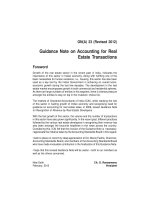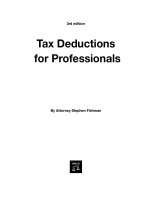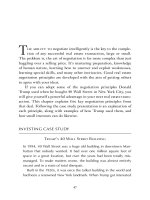Tax Deductions For Real Estate Professionals Slides To Hand Out
Bạn đang xem bản rút gọn của tài liệu. Xem và tải ngay bản đầy đủ của tài liệu tại đây (2.07 MB, 105 trang )
Tax Deductions for Real Estate
Professionals
Maureen McEnroe, CFA
Real Estate Broker
Cell 914 588 1873
Objective
• To educate and prepare Real Estate
Professionals to identify and maximize
deductions and maintain defensible records of
their deductions.
What’s in your pocket?
It is not what you make but what you get to keep
that matters. This Course will guide you through
what items are tax deductible, what records you
need to keep, and how to maximize your
deductions.
Introduction
•Thanks you for giving me the opportunity to
teach the Tax Deductions for Real Estate
Professionals /record keeping class. I want to
preface this with the fact that I am not an
Accountant, I have MBA and I am a Chartered
Financial Analyst. My background in Business but
business planning and analysis is my forte. Part of
my strength as an analyst is in forecasting and
planning.
• Warning this class was designed by a nonaccountant. There are some complex concepts
that I have tried to simplify. After having
consulted with tax professionals, tax
publications, IRS documents and Publications,
this class is an overview of the allowable and
not allowable deductions Real Estate
Professionals can utilize to legally lower their tax
burden and put more money in their pockets.
• As we all know it is not what we make but what
we keep that truly matters. As an independent
contractor, your Brokerage will give you a 1099
to represent the revenue side of the equation
• At the end of this class, you should be able to
set up the necessary records and documents to
monitor and classify the various deductions
available to you.
• The IRS indicates:
Licensed Real Estate Agents - Real Estate Tax Tips
• Most real estate professionals operate their
business as a sole proprietorship. This means
that you are not someone's employee, you
haven't formed a partnership with anyone, and
you have not incorporated your business.
• Statutory Nonemployees
• Licensed Real Estate agents are statutory
nonemployees and are treated as self-employed for
all Federal tax purposes, including income and
employment taxes, if:
• Substantially all payments for their services as real
estate agents are directly related to sales or other
output, rather than to the number of hours worked
• Their services are performed under a written contract
providing that they will not be treated as employees
for Federal tax purposes
• This category includes individuals engaged in
appraisal activities for real estate sales if they earn
income based on sales or other output.
• This means you are essentially Independent
Contractors.
• IRS Publication 334 states:
• Real Estate dealer. You are a real estate dealer
if you are engaged in the business of selling real
estate to customers with the purpose of making
a profit from those sales. Rent you receive from
real estate held for sale to customers is subject
to SE tax. However, rent you receive from real
estate held for speculation or investment is not
subject to SE tax.
The Value of Tax Deductions
• As a general rule of thumb, for agents/brokers
earning up to $100,000 per year, every dollar
deducted from your taxable income will save you
roughly $0.50 in taxes. This assumes a 28% federal
income tax, 15.3% in self-employment taxes and an
average of 6% state income taxes. In Rockland County
we have a higher local tax so our savings are a bit
higher.
• For those lucky agents making over $100,000 per
year, your deductions are worth a bit less than $0.50
on the dollar but still approaching $0.40 or so.
• According to the IRS code Section 162:
• Any expense for your real estate business is deductible if it
is:
• 1) Ordinary and necessary
• 2) Directly related to your business and
• 3) A reasonable amount
• There is no upper limit on your deductions as long as they
are reasonable, and you do not deduct more than you
spend. If you have Real Estate earnings of $12,000 and
you spent $15,000 on dues advertising, buying leads and
other related business expenses, your deduction is limited
to the $12,000 earned The good news is that in most cases
that other $3,000 is not lost, it becomes a tax loss carry
forward that can be used in future years against future
income earned.
• Doing a quick back of the envelope calculation, I would
like to quickly demonstrate the value of deductions. This
hypothetical Real Estate Agent is a single 50-year-old
person. This person earned $100,000, had business
expenses of $27.000 of which $24,000 was deductible.
We assumed a 28% federal tax rate, an 8.375% local tax
rate and a 15.3% Self Employment tax rate.
• Take that same agent and introduce the $24,000 in
itemized deductions instead of the standard deduction of
$6,300 reduces the taxable income by $17,700. Assuming
the same tax rates the agent could pay federal taxes of
$20K, State/Local taxes of $6,000 and Self-employment
taxes of $6K. The difference in the tax burden using the
allowable deductions puts approximately $7,300 more
money in this agent’s net earnings. That is like have an
extra closing! So lets get deducting!!
Comparing Standard Deduction to Itemized Deductions
Income
Std Deduction
Itemize. Deduc tion Difference
$100,000
$100,000
Expenses
$27,000
Deductible Expenses
$24,000
Std Deduction
$6,300
Tax Exemption
$4,000
$4,000
Taxable Income
$89,700
$72,000
$17,770
Federal Taxes
$25,116
$20,160
$4,596
State/Local Taxes
$7,512
$6,030
$1,482
Self Employ Taxes
$6,337
$5,087
$1,250
Value of Deductions
$7,328
Banking And Tax Planning
• As a new or even an experienced Agent or Broker, how exciting is
it to get that big check. Lets take a step back and detail how you
should be looking at this check.
• As an Independent Contractor, most accountants recommend filing
quarterly taxes. You can’t take the deductions until year-end
when you file the fiscal year taxes, but the estimated taxes are
calculated off your anticipated gross revenue for the current year.
In order to facilitate this, I recommend taking each check and
depositing it into two separate accounts. Open a separate savings
account that is not connected to your checking account.
• If you are in the 28% tax bracket, immediately
deposit at least 25%-28% of each and every
check into this saving account. This will be the
account from which you will pay your quarterly
tax payments.
• One piece of advice I can give every agent. Do
not count on the check until the deal is closed.
Deals fall apart for all kinds of reasons. If you
have already spent the money, or earmarked it
for a vacation or event, not only do you lose the
deal but you also lose that vacation which is
even more upsetting.
Self-Employment Tax
• Employees pay a 15.3% FICA Social Security/Medicare tax. This is
split evenly between the employer and the employee, so the
employees paycheck is reduced by a 7.65% FICA line item.
Workers pay into the Social Security and Medicare systems. SelfEmployed workers are given credit for Social Security and
Medicare contributions via the Self Employment Tax so these
workers will be included in these two safety net programs. Selfemployment tax is 15.3% of 92.35% of the Independent
Contractors Net Income. However in this case the government
makes an attempt to be fair. Given that there is no employer with
which to share this expense, the IRS allows Independent
Contractors to deduct 50% of their Self-employment tax. This is
itemized on the Schedule SE that has to be submitted annually
with your tax return.
Tax Deductions For Real Estate Professionals
• 1) Car/Truck A) If you are good at record
keeping keep track of all your car expenses and
figure out your annual deduction (Add up how
much you spend for gas, oil, repairs, car washes.
Maintenance etc.)
OR
B) Track how many miles you have used
your car for business and use the standard
deduction for mileage, which is $0.575 per mile
in 2015. Note the mileage you use driving to and
from work is not deductible only the mileage
used in previewing, showing, doing CMA, Open
Houses and taking clients around are deductible.
• 2) Office Expenses If you have a home office you may
be able to deduct the rent and utilities you spend for
that office. Renters and owners can take this
deduction.
• 3) Business travel If you go out of town for business
you can deduct airfare, transportation costs,
hotel/lodging expenses, 50% of the cost of meals
while you are away. (Conferences, seminars,
education, designations etc.)
• 4) Meals and Entertainment If you take a client out
and have a serious business discussion before, during
or after the meal/event, you can deduct 50% of the
cost of that meal or entertainment as a legitimate
business cost. Food at Open Houses is 100%
deductible.
• 5) Depreciation Property you buy and use for
business can be depreciated over time. Items like
cars, property, computers and office furniture can be
depreciated over time. IRS Code section 179 allows
an agent to deduct the full price of business
equipment, furniture and other long term items
purchased for your personal use in a home or brokers
office in the year purchased
• 6) Supplies Business items you use up in less than
one year such as paper ink/toner for printers,
paperclips, postage etc. computer software, internet
and phone service fees
• 7) Legal/Professional Services Any fee you pay to an
accountant, lawyer, consultant or other professional
is deductible.
• 8) Insurance Insurance that you buy just for your
business is deductible. Business liability insurance (E&O).
If you have a home office, you may be able to deduct a
portion of your homeowners insurance. Self-employed
people are allowed to deduct 100% of their health
insurance premiums from their income taxes. Medical
expenses when they reach a certain limit and health
savings account contributions may also be deductible.
• 9) Marketing/Advertising This is a category often under
reported and therefore deductions are missed.
Deductions include funds spent on websites, mailing lists,
newspaper or online advertising, flyers, postcards, Just
Listed Just Sold Cards, promotional materials, logo
clothing. If you order pens, calendars or seeds to give to
clients these are all deductible. Did you take a Real Estate
Ad out in a local journal or fundraising event—it is
deductible. Pictures can be another deduction.
• 10) Business Gifts Many agents hand their client a
gift at the closing. Each gift can be deducted for up to
$25. Unfortunately that $100 or $200 restaurant gift
certificate cannot be fully deducted.
• 11) Desk Fees Not all Brokers charge Desk or
Technology fees, but if they do, those fees are
deductible.
• 12) Professional Dues, Fees, Subscriptions The
HGAR, NYSAR and all professional Real Estate
Organization fees and dues are deductible. Your
monthly eKey charge and your bi-annual license
renewal fees are also deductible. Any Real Estate
print or online magazines and periodicals you
purchase are deductible.
• 13) Education Classes you take in person or
online that are necessary to maintain your
license or further your education—the cost of
these classes are deductible. The cost of the
22.5 credits we must take every two years is a
deduction. Please note the cost of obtaining the
Sales Agent or Brokers License is not deductible.
• 14) Retirement Plan Contributions If you make a
contribution to a retirement plan, 401k Roth IRA
etc., that contribution is a nice deduction.
• 15) Interest Interest on business loans or
interest paid for a business credit card is
deductible.
• Brokerages have several other tax deductions
available including, Office expenses like rent,
cleaning and maintenance, utilities, office
supplies, Referral Fees and commission rebates,
franchise fees, taxes including payroll taxes for
employees, state and local business taxes,
wages and benefits paid to employees.
Accounting Expenses
• Accounting related to your business, your LLC or
S Corp. You can deduct the cost of an
accounting system installation or
accounting/record keeping applications
purchased to manage your business.
Advertising /Marketing Expenses
• Business cards, home demonstrations,
promotional activities performed in person,
online, mailed. Signs, internet Ads, fundraiser
sponsorships, Ads in Periodicals, Flyers, Just
Listed/Just Sold Cards, Logo Clothing, Postcards,
EDDM mailings, Lead Generation, Premium
Agent fees in Trulia, Zillow Realtor.com etc.









